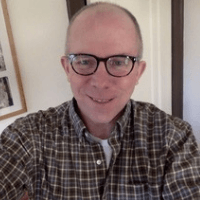 Meet Paul McDowell of Cleveland, Ohio. It has been 23 years since his last treatment for two brain tumors, including a glioblastoma (GBM). While Paul can’t explain his survival from two tumors, he believes living in the present and doing the things that you love is good therapy. Read on to learn how he’s living in the present by helping others to live for tomorrow.
Meet Paul McDowell of Cleveland, Ohio. It has been 23 years since his last treatment for two brain tumors, including a glioblastoma (GBM). While Paul can’t explain his survival from two tumors, he believes living in the present and doing the things that you love is good therapy. Read on to learn how he’s living in the present by helping others to live for tomorrow.
1. Please tell us about yourself.
My name is Paul McDowell, and I am a mentor in the American Brain Tumor Association’s Patient & Caregiver Mentor Support Program. I also volunteer at my local food bank, history museum and Ronald McDonald House. I taught French and theater at the University of Notre Dame for 25 years. I love reading, especially historical fiction. I also enjoy biking and walking.
2. How did you find out about your brain tumor? What was your reaction and your loved ones’ reaction?
My 23-year survival from two brain tumors, including a GBM, is uncommon. I wish I could tell some heroic or motivational story to explain my survival. I will say that the effects of my brain tumor diagnoses on my wife and children were profound. There seemed to be an almost cruel pattern in my story of brain tumors and babies.
I had my first grand mal seizure in December 1993, where I was taken to the emergency room for further tests. The results of my first MRI confirmed that I had a brain tumor in my right frontal lobe. I was surprisingly calm when I heard the news, likely because I was still in a daze from my seizure. Following my first brain surgery, my wife and I were relieved to learn that the tumor was a low grade tumor, a grade II astrocytoma. No additional treatments were necessary. We were expecting our first child in March, and the fact that the tumor was benign seemed like a detour on the road to parenthood.
Two years later, I was stunned to learn that my brain tumor returned in the same area. We were expecting our second child two weeks later, but my wife and I were devastated to learn that my second brain tumor was a more serious kind, a GBM. My treatment required seven months of chemotherapy and six weeks of daily radiation. The fact that the tumor was cancerous left me crying in my car before I could head back home. Even though our first daughter was only two years old when my recurrence crashed its way into our lives, she knew something was different. I went to my first radiation treatment knowing that our second baby would be born any day, and sought some hope. Unfortunately, the response of the medical staff was not hopeful to me.
3. How have you helped others through your brain tumor journey?
The response of my medical team was enough to make me think about offering hope, not false hope, but hope that, despite the statistics, living in the present and continuing to do the things that you love is good therapy. This is why I did not hesitate to sign up for the ABTA’s Patient & Caregiver Mentor Support Program five years ago. This type of mentorship program didn’t yet exist when I was dealing with my brain cancer more than 20 years ago.
I am grateful to have the telephone as a means of communication with my mentees, but I have enjoyed meeting a mentee in person. I am a huge Chicago Cubs fan, and I currently work with a mentee who is an equally huge Cleveland Indians fan. We connect through baseball. I drove to my mentee’s house three hours away and went to an Indians game together. We had an amazing time. It was an experience that I will never forget!
“I continue to be surprised at how quickly and easily we form bonds in the ABTA mentorship program.”
Being present to a person who needs you is the very essence of the Patient & Caregiver Mentor Support Program. Potential mentors should know that there is no right way or wrong way to have a conversation. I have had mentees call me to confirm what my secret ingredient is in my chocolate chip cookies (oatmeal!), and call back two days later to discuss how to deal with the fatigue they see in their partners or caregivers. I continue to be surprised at how quickly and easily we form bonds in ABTA’s mentorship program. I can almost hear a sigh of relief in every first conversation I have with my mentees. That sigh means “Finally! Somebody gets it.”
Are you in need of social support? Learn more about ABTA’s Patient & Caregiver Mentor Support Program.
